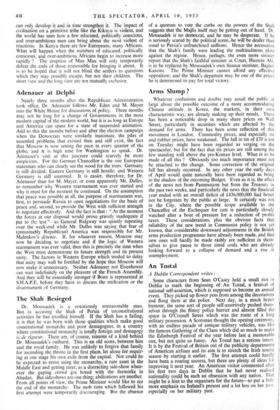Arms Slump ?
Whatever confusions and doubts may assail the public at large about the possible outcome of a more accommodating Chinese attitude in Korea, the markets, in their own characteristic way, are already making up their minds. There has been a noticeable drop in many share prices on Wall Street, particularly in securities which are affected by the demand for arms. There has been some reflection of this movement in London. Commodity prices, and especially tin and rubber prices, have weakened. The fall in tin of £70 a ton on Tuesday might have been regarded as verging on the spectacular, but for the fact that tin prices are still among the few standing well above the pre-Korean level. What is to be made of all this ? Obviously too much importance must not be attached to the change. Some correction of the original fall has already occurred. In any other year the early days of April would quite naturally have been regarded as being in the shadow of the oncoming Budget. Even as it is, the effect of the news not from Panmunjom but from the Treasury in the past two weeks, and particularly the news that the financial year ended with an overall deficit of £436,000,000 had better not be forgotten by the public at large. It certainly was not in the City, where the possible scope available to the Chancellor of the Exchequer for cuts is particularly closely watched after a bout of pressure for a reduction of profits taxes. These considerations, plus the obvious facts that reliability of the new trend in Communist policy is not yet known, that considerable downward adjustments in the British arms production programme have already been made, and that new ones will hardly be made rashly are sufficibnt in them- selves to give pause to those timid souls who are already looking forward to a collapse of demand and a rise in unemployment.


































 Previous page
Previous page